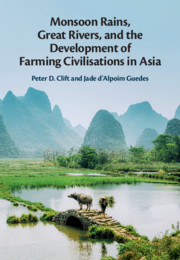Book contents
- Monsoon Rains, Great Rivers, and the Development of Farming Civilizations in Asia
- Monsoon Rains, Great Rivers, and the Development of Farming Civilizations in Asia
- Copyright page
- Contents
- Acknowledgments
- 1 Introduction
- 2 Temporal Variations in the Asian Monsoon
- 3 Monsoon and Societies in Southwest Asia
- 4 Origins of a Uniquely Adaptive Farming System:
- 5 Dryland Farming in the Northern Monsoon Frontier
- 6 Recent Changes in Monsoon Climate
- 7 Future Monsoon Predictions
- References
- Index
1 - Introduction
Published online by Cambridge University Press: 17 December 2020
- Monsoon Rains, Great Rivers, and the Development of Farming Civilizations in Asia
- Monsoon Rains, Great Rivers, and the Development of Farming Civilizations in Asia
- Copyright page
- Contents
- Acknowledgments
- 1 Introduction
- 2 Temporal Variations in the Asian Monsoon
- 3 Monsoon and Societies in Southwest Asia
- 4 Origins of a Uniquely Adaptive Farming System:
- 5 Dryland Farming in the Northern Monsoon Frontier
- 6 Recent Changes in Monsoon Climate
- 7 Future Monsoon Predictions
- References
- Index
Summary
The Asian summer monsoon provides most of the moisture supply across Asia supporting large populations, controlling the natural vegetation and types of agriculture practiced. Colder conditions at the Glacial Maximum resulted in weaker summer precipitation, with the warmest, wettest conditions peaking around 6000–8000 years ago. We review how temperature, rainfall, changes in river load and course, and sea-level rise have intersected to create the unique agricultural landscape of Asia. Temperatures related to monsoonal pattern dictate the number of growing days for various critical crops, constraining where rice, millet, and wheat can be cultivated. The monsoon also provides water for the major rivers many of which originate in the Tibetan Plateau and which supply waters to the fertile floodplains across the region. Rapid glacial melting at 8200 years ago resulted a sharp drying of the climate in Asia lasting around 400 years. Rainfall particularly declined in peninsular India as well as in North China, now regions of dense population. This event can be used as an analog for potential future warming of the global climate into the twenty-first century.
- Type
- Chapter
- Information
- Publisher: Cambridge University PressPrint publication year: 2021



